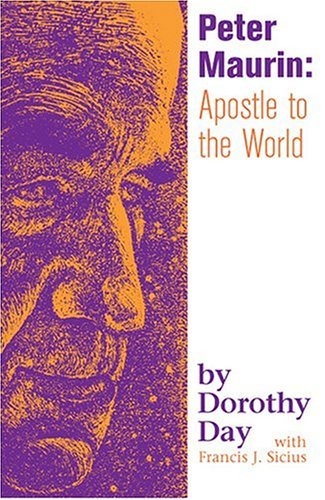
|
Posted November 30, 2004
Book: Peter Maurin: Apostle to the World Author: Dorothy Day with Francis J. Sicius Orbis Books, Maryknoll, NY, pp. 186 An Excerpt from the Introduction:
An Excerpt from the Book: Peter Maurin died as he had lived the last twenty years of his life. He was laid to rest in a borrowed suit in a borrowed grave. In history’s judgment his life and work had little significance. There is no movement named after him, his ideas are not mentioned in any general text of philosophy or religion, despite his numerous essays on both. He left nothing that we can objectively document as evidence of his success. However, in his failure was Maurin’s greatest triumph. He reminded us that true community, for which all humanity yearns, lies beyond temporal measurement. His Green Revolution was more than a simple “return-to-the-land” refrain. It called people to be at peace with each other and with the earth, to take no more than was needed, to share, to love, and to seek the harmony with earth and humanity that comes from envisioning the infinite. In Maurin’s mind, the nineteenth century, which nurtured the seemingly miraculous world of material progress, upset the balance between spiritual and material, and as a result it prefaced a century of unprecedented violence and crimes against the human community. Maurin wanted to rebalance the spiritual with the material. His model was Christ, the voice of God entering history in order to redeem it, the preeminent fusion of the infinite with the finite. For this reason, he literally “put on Christ, “ as Dorothy Day said. He loved, he shared, and he lived the beatitudes, in the never-dying hope of realizing the kingdom of God. He “so felt the tremendous importance of this life,” Day wrote, “he made us feel the magnificent significance of our work, our daily lives, the material of God’s universe, and what we did with it and how we used it.” In Loaves and Fishes Dorothy offered this assessment of Peter: He was good as bread. He was not gay or joyful, as others have described him, but he was a truly happy man, with the happiness a man feels when he has found his vocation in life and has set out on the way and is sure of himself; and sure, too, that others are searching for and willing to undertake their task in life, striving not only to love God and their brother but to show that love. Peter had faith in people as well as in ideas, and he was able to make them feel his faith in them, so that they gained confidence and overcame the sense of futility that so plagues the young of today. In fact, he gave me so great a faith in the power of his ideas that if he had said, “Go to Madison Square Garden and speak these ideas,” I would have overcome all sense of fear and would have attempted such a folly, convinced that, though it was the “folly of the Cross” and doomed to failure, God Himself could take this failure and turn it into victory.” Table of Contents: Introduction: Day and Maurin 1. The French peasant 2. Canada 3. A fateful meeting 4. The Catholic Worker begins 5. Life with Peter 6. Clarification of thought 7. Houses of hospitality 8. The Green Revolution 9. Peter’s Digests 10. A good man |
|
